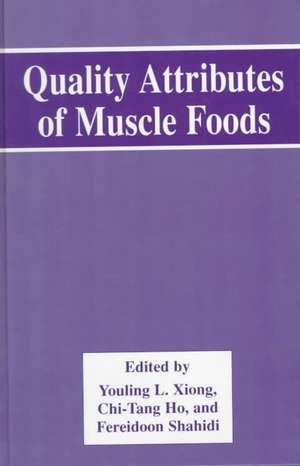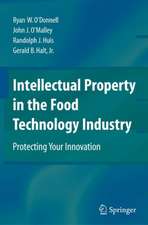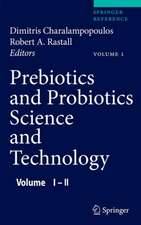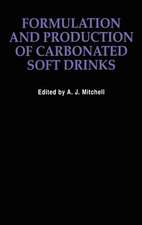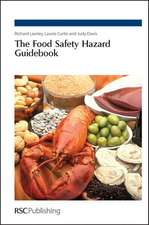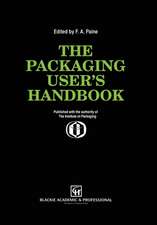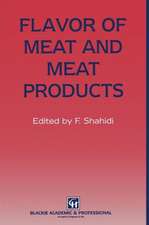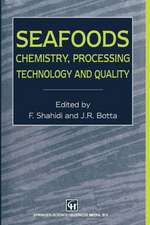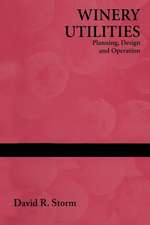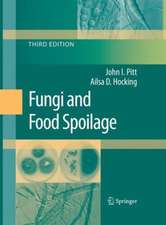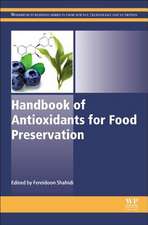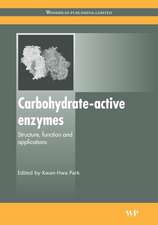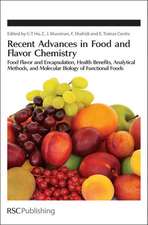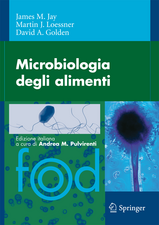Quality Attributes of Muscle Foods
Editat de Youling L. Xiong, Chi-Tang Ho, Fereidoon Shahidien Limba Engleză Hardback – 29 iun 1999
| Toate formatele și edițiile | Preț | Express |
|---|---|---|
| Paperback (1) | 956.69 lei 6-8 săpt. | |
| Springer Us – 4 noi 2012 | 956.69 lei 6-8 săpt. | |
| Hardback (1) | 957.75 lei 6-8 săpt. | |
| Springer Us – 29 iun 1999 | 957.75 lei 6-8 săpt. |
Preț: 957.75 lei
Preț vechi: 1167.99 lei
-18% Nou
Puncte Express: 1437
Preț estimativ în valută:
183.28€ • 190.19$ • 153.20£
183.28€ • 190.19$ • 153.20£
Carte tipărită la comandă
Livrare economică 17-31 martie
Preluare comenzi: 021 569.72.76
Specificații
ISBN-13: 9780306461163
ISBN-10: 0306461161
Pagini: 433
Ilustrații: IX, 433 p.
Dimensiuni: 178 x 254 x 25 mm
Greutate: 0.8 kg
Ediția:1999
Editura: Springer Us
Colecția Springer
Locul publicării:New York, NY, United States
ISBN-10: 0306461161
Pagini: 433
Ilustrații: IX, 433 p.
Dimensiuni: 178 x 254 x 25 mm
Greutate: 0.8 kg
Ediția:1999
Editura: Springer Us
Colecția Springer
Locul publicării:New York, NY, United States
Public țintă
ResearchDescriere
A major challenge for the meat and seafood industries continues to be that of pro ducing high-quality, wholesome products. Consumers' demand for reduced-fat, low-fat, and fat-free meats (red meat, poultry, and seafood) with acceptable flavor, texture, and other sensory characteristics or those similar to typical, traditional high-fat meats has im parted further urgency to rising to this challenge. Consequently, meat scientists strive to develop different antemortem strategies as well as to improve on existing postmortem processing technologies in order to meet this consumer demand. While the microbiological quality of meat, meat products, and seafoods is important from a food safety standpoint, it is the physicochemical attributes and the interactions of the various chemical components of muscle and ingredients which directly influence the product palatability and consumer acceptability. Virtually every step in production and processing, including animal dietary regime, antemortem stress conditions, postmortem handling, product formulation, temperature of processing, packaging, and storage, affects the quality attributes of muscle foods.
Cuprins
1. Quality Characteristics of Muscle Foods: An Overview; Y.L. Xiong, et al. Section 1: Dietary and Processing Strategies to Improve Meat Color and Flavor. 2. Animal Production Origins of Some Meat Color and Flavor Attributes; O.A. Young, et al. 3. Vitamin E: Efefct on Meat Color and Flavor; S.L. Melton. 4. The High Energy Diet for Salmon: Effect of Fat on Muscle Quality; R.G. Ackman, et al. 5. Accumulation of Conjugated Linoleic Acid (CLA) In Tissues of Fish Fed Diets Containing Various Levels of CLA; B.-D. Choi, et al. 6. Quality and Shelf-Life of Meat in Case-Ready Modified Atmosphere Packaging; K.W. McMillin, et al. 7. Storage Stability of Meat Products as Affected by Organic and Inorganic Additives and Functional Ingredients;K.S. Rhee, et al. Section 2: Indigenous and Process-Generated Meat Flavors. 8. Current Status of Meat Flavor; S.L. Melton. 9. Flavor of Lamb and Mutton; J.J. Jamora, K.S. Rhee. 10. Effect of Castration and Slaughter Age on the Flavor of Sheepmeat; J.M. Ames, M.M. Sutherland. 11. Role of Selected Precursors in Meat Flavor Formation; L.J. Farmer, et al. 12. Effect of Thiamin Oxidation on Thermal Formation of Meaty Aroma Compounds; C.-Y. Tai, et al. 13. Quality Attributes of Muscle Foods as Affected by Nitrite and Nitrite-Free Curing; R.B. Pegg, F. Shahidi. 14. Effect of Cooking on Consumers' Perceptions of Mackerel (Scomber scombrus) of Poor Quality; C. Alasalvar, et al. Section 3: Muscle Protein Biochemistry and Meat Quality. 15. Muscle Extracellular Matrix: Role in Growth, Development and Meat Tenderness;R.J. McCormick, A.L. Phillips. 16. Postmorten Mechanisms of Meat Tenderizatin: The Roles of the Structural Proteins and the Calpain System; E. Huff-Lonergan, S.M. Lonergan. 17. Controlling Endogenous Enzyme Activity in Seafood; A. Sequeira-Munoz, et al. 18. Oxidation of Fish Sarcoplasmic Reticular Lipids and Proteins; A. Soyer. 19. Association of Malonaldehyde with Myosin and Subfragment 1; A.J. King, S. Li. 20. Monoclonal Antibodies Against Heat-Treated Muscle Proteins for Species Identification and End-Point Temperature Determination in Cooked Meats; Y.-H.P. Hsieh, et al. Section 4: Muscle Protein Functionality and Meat Product Quality. 21. The Role of Proteins in Water-Holding Capacity of Meat; R.L.J.M. van Laack. 22. Phosphate-Mediated Water Uptake, Swelling, and Functionality of the Myofibril Architecture; Y.L. Xiong. 23. Water Immobilization in Low-Fat Meat Batters; P.J. Shand. 24. Advances in Determining Meat Emulsion Stability; S. Barbut. 25. Muscle Polymorphism and Gelling Properties of Myofibrillar Proteins from Poultry, Mammals and Fish; F. Lefvre. 26. Effect of Cathepsins B, L, L-like and Calpain on the Protein Degradation of Surimi; S.-T. Jiang, G.-H. Chen. 27. The Role of Endogenous Proteases in Gel-Weakening of Beef Heart Surimi; B. Wang, Y.L. Xiong. 28. Gelation Properties of Fish Proteins Under Ohmic Heating; J.W. Park, J. Yongsawatdigul. Index.
